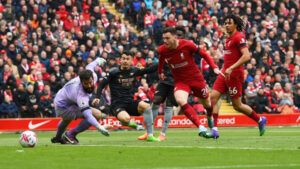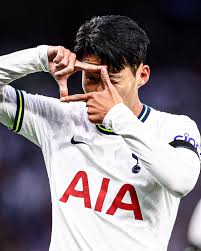Understanding the Complexities of Luis Rubiales Situation
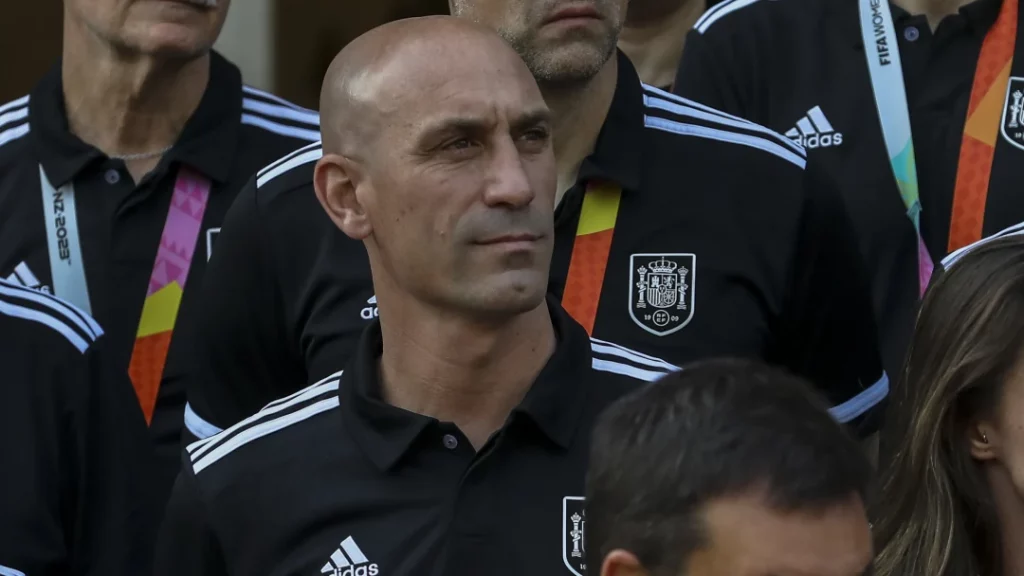
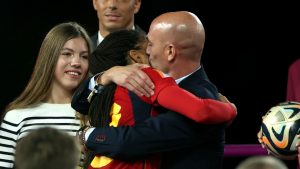 Luis Rubiales, the 46-year-old head of Spain’s football federation, has come under scrutiny for his controversial actions during the FIFA Women’s World Cup final. Spain secured their first-ever world title with a 1-0 victory over England. Rubiales is currently facing demands for his resignation due to an incident involving star player Jennifer Hermoso.
Luis Rubiales, the 46-year-old head of Spain’s football federation, has come under scrutiny for his controversial actions during the FIFA Women’s World Cup final. Spain secured their first-ever world title with a 1-0 victory over England. Rubiales is currently facing demands for his resignation due to an incident involving star player Jennifer Hermoso.
During the medal presentation at Stadium Australia in Sydney, Rubiales cupped Jennifer Hermoso’s head and forcefully kissed her, sparking outrage and calls for his removal from the position. However, this is not the first time Rubiales has made headlines for controversial behavior.
Rubiales has a history of contentious incidents, from his role as a union leader to his current tenure as the president of the Royal Spanish Football Federation (RFEF). His career trajectory has been marked by both achievements and controversies.
From Footballer to Union Leader
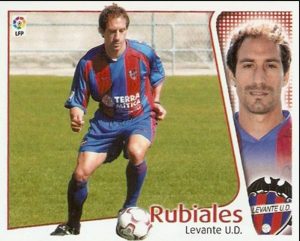 Luis Rubiales, originally from Spain’s Canary Islands but raised in Motril on the Mediterranean coast, transitioned from being a midfielder in lower division teams to becoming a prominent figure in the football world.
Luis Rubiales, originally from Spain’s Canary Islands but raised in Motril on the Mediterranean coast, transitioned from being a midfielder in lower division teams to becoming a prominent figure in the football world.
Rubiales played as a modern defender known for his strength and attacking abilities. He garnered respect for his dedication and loyalty during his time at Levante, where he played from 2003 to 2008. It was here that he led a player uprising against unpaid wages, likely influenced by his father’s role as a Socialist mayor.
This experience fueled Rubiales’ commitment to advocating for players’ rights. From 2010 to 2017, he headed the Spanish football players’ union, AFE. During his leadership, AFE initiated two national players’ strikes in 2011 and 2015, and he played a key role in establishing a fund to address unpaid salaries. Rubiales also successfully negotiated for AFE to receive a portion of La Liga’s TV broadcast revenues.
Clashes with Javier Tebas
Luis Rubiales found himself at odds with La Liga president Javier Tebas from an early stage, a rivalry that persisted even after Rubiales assumed the presidency of the football federation in 2018. Tebas had openly expressed doubts about Rubiales’ qualifications for the position. Rubiales secured his presidency by defeating Juan Luis Larrea, the federation’s former treasurer and interim leader. Larrea had taken over temporarily after Angel Maria Villar, the long-standing president, was suspended due to allegations of embezzlement and other misconduct.
With a determined spirit, Rubiales confidently declared, “I’m going to win for sure,” before the election. Shortly after his victory, he made a surprising decision by firing Spain’s men’s national coach Julen Lopetegui just two days before the kickoff of the 2018 World Cup.
Rubiales continued to make headlines as he was re-elected as the federation’s president in 2020. However, his decisions didn’t always sit well with traditionalists in Spanish football. He expanded Spain’s Super Cup, a contest between league champions and Copa del Rey winners, into a four-team format, drawing criticism from purists.
One of his most controversial moves was inking a lucrative deal to hold the Super Cup competition in Saudi Arabia. This decision faced intense backlash due to Saudi Arabia’s alleged human rights abuses. Despite the lucrative opportunity, the deal sparked debates over the ethical considerations of associating with a country under scrutiny.
Rubiales’ journey as the president of the football federation has been marked by clashes, impactful choices, and contentious debates that reflect the complexities of his leadership tenure.
Allegations of Financial Misconduct
In 2022, leaked audio recordings from 2019 surfaced in Spanish media, hinting at financial controversies surrounding the Spanish Super Cup’s relocation to Saudi Arabia. The recordings suggested that a company named Kosmos, owned by former Barcelona defender Gerard Pique, received millions of euros in commission from the deal. Rubiales swiftly dismissed these allegations as “falsehoods,” expressing anger over what he deemed the illegal acquisition of information from his mobile device (hacking of his mobile phone to get information).
However, amidst these financial challenges, Rubiales earned commendation for revitalizing the federation’s economic landscape. He successfully increased the number of sponsors, bolstering revenues. Simultaneously, Rubiales’s efforts improved conditions for lower-tier teams, a transformation that garnered support from regional football federations. Oscar Fle, (president of the football federation in the northeastern region of Aragon) praised Rubiales for ushering the institution into the modern era, stating,
“He has achieved a sea-change, putting a 19th-century institution in the 21st century.”
Notably, Rubiales made significant strides in advancing women’s football. In 2022, he tripled the budget for women’s football, allocating 406 million euros ($439 million). However, his approach wasn’t without controversy. When 15 members of the national women’s team staged a mutiny over their coach Jorge Vilda’s methods, Rubiales aligned with Vilda, a decision that yielded unexpected success as the team clinched the Women’s World Cup. Nonetheless, Rubiales’ exuberant celebration following the victory placed his position in jeopardy, illustrating the delicate balance he faces in his leadership role.
Las 15 vs the National Team Coach
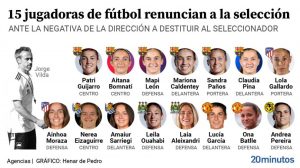 The Spanish women’s national team faced a pivotal challenge under the leadership of coach Jorge Vilda, who took charge in 2015. Despite persistent calls for his removal from several players, the 42-year-old remained at the helm of La Roja. This discord reached a breaking point when 15 core players, known as “Las 15,” opted out of national team selection last year as a form of protest. Regrettably, their efforts yielded no favorable outcome. Among these players, only three participated in the World Cup in Australia and New Zealand.
The Spanish women’s national team faced a pivotal challenge under the leadership of coach Jorge Vilda, who took charge in 2015. Despite persistent calls for his removal from several players, the 42-year-old remained at the helm of La Roja. This discord reached a breaking point when 15 core players, known as “Las 15,” opted out of national team selection last year as a form of protest. Regrettably, their efforts yielded no favorable outcome. Among these players, only three participated in the World Cup in Australia and New Zealand.
The Spanish Football Association (FA) strongly condemned the players’ actions. It declared, “The FA is not going to allow the footballers to keep questioning the role of our national manager and his backroom staff. We are not going to submit to any sort of pressure.” The FA also issued a stern warning of potential sanctions, including a two to five-year exclusion from selection, for those who participated in the protest.
In response, Luis Rubiales, unfazed by the situation, maintained a resolute stance. He defended Vilda’s integrity as a hardworking, world-class coach who remained loyal to the Spanish team despite offers from other federations. Rubiales emphasized the federation’s commitment to those who were dedicated to the team’s growth, sidestepping those he believed held resentment or sought to undermine the team’s progress.
The ongoing struggle between the players and the coach highlighted the complex dynamics within the Spanish women’s national team. The clash of opinions, leadership disputes, and player protests underscored the challenges faced by Rubiales as he navigated the delicate balance of managing a team amidst such discord.
Rubiales’ Actions at FIFA Women’s World Cup Final
During the FIFA Women’s World Cup final, the Spanish team’s victory was marred by controversy stemming from the behavior of Luis Rubiales, Spain’s football federation chief. As the Spanish team stepped forward to receive their medals, Rubiales’ actions with one of the players, Jennifer Hermoso, drew significant attention.
When Hermoso reached Rubiales on the podium, he lifted her in his arms and proceeded to kiss her forcefully on the lips, a gesture that raised eyebrows and prompted discussions. Rubiales was also seen celebrating the victory by carrying Athenea del Castillo Beivide on his shoulder.
Footage captured from the dressing room after the match further showcased Rubiales’ interactions with Hermoso. In a light-hearted tone, he announced a holiday to Ibiza for the team, stating, “There, we will celebrate the wedding of Jenni and Luis Rubiales.” Hermoso, in a later Instagram live stream, expressed her discomfort, saying, “I didn’t like it,” even though she appeared to be laughing at the time.
Additional images from the event depicted Rubiales celebrating alongside Queen Letizia and her 16-year-old daughter Sofia, where he was seen grabbing his crotch. Following the uproar caused by his actions, Rubiales admitted his mistake in a video posted on social media by Spanish television. He explained that his behavior had been a result of the euphoria of the moment and had not been intended to cause any harm.
Despite Rubiales’ explanation, his actions during the medal ceremony and celebrations have sparked controversy and raised questions about his conduct and appropriateness. The incident has led to discussions about the importance of maintaining professionalism in such high-profile events, and it remains to be seen how the fallout from this incident will impact Rubiales’ position and reputation.
Amidst the ongoing controversy, another incident that has been frequently discussed is the Women’s Supercopa held in January. This event highlighted a significant difference in the way celebrations were handled compared to the recent controversy involving the federation president.
At the Women’s Supercopa presentation, the winning team, Barcelona, found their medals placed in a box for the players to retrieve themselves. This contrasted sharply with the more hands-on approach observed during the recent medal ceremony and celebrations involving Luis Rubiales, the federation’s president.
The choice to leave the medals for the players to collect personally was viewed by many as a response to the past protests by several members of the Barcelona squad against the federation. This episode underscores the complex dynamics and underlying tensions within the sport, both in terms of team-player relationships and the broader context of recent events.
As discussions continue, the Women’s Supercopa incident serves as a notable counterpoint, drawing attention to how different events can unfold in the world of football, and shedding light on the intricate interactions between teams, players, and governing bodies.
Player’s Response and Union Involvement in Rubiales Controversy
On the following Sunday, the Royal Spanish Football Federation (RFEF) released a statement quoting Jennifer Hermoso, the star player at the center of the controversy. In her statement, she described the incident as a “totally spontaneous mutual gesture” driven by the immense joy of winning a World Cup. Hermoso emphasized her positive relationship with the president, characterizing the act as a natural display of affection and gratitude.
However, a Spanish sports media website, Relevo.com, reported a conflicting viewpoint. According to the report, the quotes provided by RFEF to news agencies like AFP and EFE were not actually from Hermoso. Instead, the report claimed that the federation’s communications department had crafted the statement without consulting Hermoso, raising questions about the authenticity of her initial response.
In a subsequent development last week, Jennifer Hermoso took a more assertive stance. In a statement released last week wednesday, the 33-year-old midfielder announced that FUTPRO, the Spanish players’ union, would handle the case on her behalf. Hermoso conveyed that she was entrusting her union and her agency, TMJ, to advocate for her interests and communicate on her behalf regarding the matter.
FIFPRO, the global players’ union, also supported Hermoso’s efforts. They expressed their solidarity with her and emphasized the significance of the incident taking place before a worldwide television audience. FIFPRO condemned any uninvited physical actions toward players, particularly when they are vulnerable due to their professional relationship with an authority figure.
The evolving response from Jennifer Hermoso, the involvement of players’ unions, and the international players’ union’s backing highlight the gravity of the incident and its implications for players’ rights and professional conduct. As the controversy unfolds, it underscores the need for respectful and appropriate behavior within the sports arena and the broader context of workplace dynamics.
Fifa Suspension
In the ongoing aftermath of the World Cup final incident, Luis Rubiales, the president of the Spanish Football Association (RFEF), has been handed a provisional 90-day suspension from all football-related activities by FIFA’s disciplinary committee. This suspension comes as a response to the incident involving Rubiales and player Jennifer Hermoso during the World Cup final.
Further complicating the situation, multiple members of the coaching staff from the victorious World Cup team have resigned due to the controversy. Among those who have stepped down are assistant managers Montse Tome, Javier Lerga, and Eugenio Gonzalo Martin, along with physio Blanca Romero Moraleda and goalkeeping coach Carlos Sanchez. Additionally, six coaches responsible for youth sides within the organization have also left their positions.
In a joint statement released on Saturday, these coaching staff members expressed their strong condemnation of Rubiales’ behavior. They contradicted Rubiales’ version of events and highlighted that Jennifer Hermoso herself has stated that she felt like a “victim of aggression.” The coaches found Rubiales’ actions and statements unacceptable, leading them to make the decision to resign from their roles.
FIFA confirmed the suspension on Saturday afternoon, revealing that the disciplinary committee had taken this step while the investigation was underway. The suspension prohibits Rubiales from engaging in any football-related activities at both national and international levels. In addition to the suspension, Rubiales has also been instructed not to contact Jennifer Hermoso or her close associates during the ongoing investigation. Moreover, the Spanish FA, its employees, and officials are also barred from contacting Hermoso throughout the duration of the investigation.
The suspension and subsequent resignations reflect the serious nature of the incident and its repercussions within the realm of football. FIFA’s intervention underscores the significance of maintaining professionalism and ethical behavior within the sport and reinforces the need for a thorough examination of the matter.
